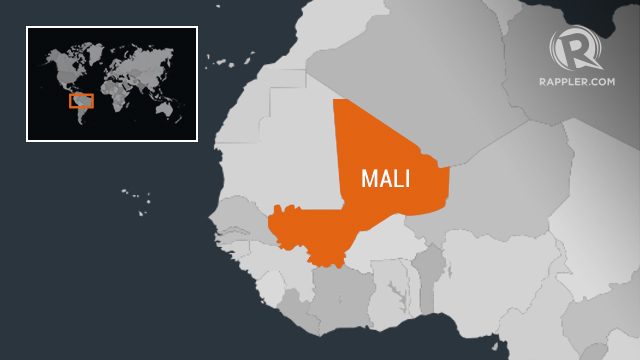SUMMARY
This is AI generated summarization, which may have errors. For context, always refer to the full article.

BAMAKO, Mali (4th UPDATE) – Twelve people were killed, two of them foreigners, in a hostage siege at a hotel in central Mali that ended early Saturday, August 8, when government troops stormed the building, the army said.
“There are 12 dead in all,” an army officer told Agence France-Presse (AFP) after the operation at the Hotel Byblos in Sevare, listing the fatalities as 5 “terrorists”, 5 soldiers, and two “white people”, whose identities were being checked.
A senior source in the Malian army said the final toll had yet to be confirmed and would “probably” be higher.
The body of one of the foreign victims had lain in front of the hotel since Friday when the gunmen stormed the building, the officer said.
A source told AFP that “a number of hostages” had been freed from the hotel, including 5 foreigners, although their nationalities were not specified.
Located a few kilometers from the regional capital Mopti, Sevare is a key staging post on the road to Mali’s desert north which fell to Islamic extremists in 2012.
The UN peacekeeping mission (MINUSMA) said in a statement on Friday that “reports indicate that a member of the international personnel associated with MINUSMA was killed in the attack”.
Sources said 3 South Africans, a Frenchman and a Ukrainian had been registered at the hotel at the time of the attack. A Russian diplomat said a Russian was among the hostages.
A source told AFP that a Russian man “hidden inside the building” had supplied “useful information” to Malian forces during the siege.
Gunmen had burst into the hotel at around 7:00 am (0700 GMT or 3 pm Philippine time) on Friday, according to the government. At least one of the attackers was said to be wearing an explosives belt.
Malian forces cordoned off the area but their efforts to dislodge the attackers were complicated by the presence of hostages.
There were exchanges of fire throughout Friday and the army brought the siege to an end early Saturday, with one source saying foreign special forces were also involved.
The UN mission said the initial target of the attack was a Malian military site.
“The attackers, who were pushed back by the Malian Armed Forces, then took refuge in a hotel,” MINUSMA said.
A spokesman for the Russian embassy in Mali told the RIA Novosti agency that the Russian hostage was an employee of UTAir, an aviation company that works with the UN peacekeeping mission.
A Ukrainian hostage managed to escape from the hotel and said up to 5 gunmen had led the hostage-taking in Sevare, which lies 620 kilometers (385 miles) south of the capital Bamako.
French President Francois Hollande said French citizens could also “possibly” be caught up in the attack.
Sporadic attacks
No one has claimed responsibility for the attack, which comes as Mali battles a resurgence in jihadist violence, two years after a French-led offensive routed 3 Islamist factions from most parts of the country.
France has more than 1,000 soldiers based in northern Mali as part of regional anti-terrorist efforts.
The hotel attack was the third assault in just a week in Mali, which is still struggling to restore stability despite a landmark peace deal agreed in June to end years of unrest and ethnic divisions.
Islamist militants have kidnapped a number of foreigners in Mali in recent years, at least two of whom are still being held hostage by Al-Qaeda’s front group in the region AQIM.
AQIM and two allied Islamist groups seized control of Mali’s north in 2012 before being ousted by French and Malian forces in January 2013.
The insurgents have continued to mount sporadic attacks from their bases in the desert, mainly in the north.
But the attacks have spread since the beginning of the year to the center of the country and to the south near the borders with Ivory Coast and Burkina Faso. – Ahamadou Cisse, AFP/Rappler.com
Add a comment
How does this make you feel?





There are no comments yet. Add your comment to start the conversation.